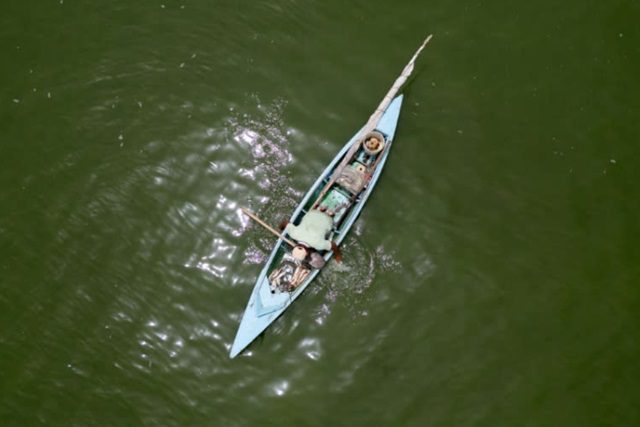BTN News: Once a bustling symbol of Venezuela’s oil wealth, Lake Maracaibo now presents a bleak picture. Its once-clear waters are now tainted with a black sheen of oil and gasoline, symbolizing the rapid decline of the country. Maracaibo, once the heart of Venezuela’s prosperous oil industry, now struggles with daily power outages, fuel shortages, and a population forced to leave in search of better prospects. As the nation heads towards the presidential elections on July 28, where Nicolás Maduro seeks re-election against Edmundo González Urrutia, the deteriorating state of Maracaibo and its surroundings provides a stark backdrop.
The Grim Reality of Lake Maracaibo
The shores of Lake Maracaibo are coated in black oil. Fishermen, wearing rubber boots stained with petroleum and shirts soaked in sweat, labor under the scorching heat to remove the sticky oil from the shores. This arduous task has become a daily routine, as the fishermen struggle to maintain their livelihoods amidst the environmental disaster. Yordi Vicuña, a 34-year-old fisherman, describes the heartache and frustration of seeing their catch diminish and the constant need to replace oil-damaged equipment. “We don’t want our lake to die. We cry and suffer seeing what’s happening,” he laments.
Experts trace the collapse of Venezuela’s oil industry back to mismanagement and corruption within PDVSA, exacerbated by U.S. sanctions since 2019. The continuous oil spill is a glaring consequence of this decline.
Ghost Towns and Deserted Shores
Cabimas, once thriving on the eastern shore of Lake Maracaibo, now resembles a ghost town. Few oil pumps are operational, and abandoned hotels and restaurants add to the desolation. Guillermo Albeniz Cano, a 64-year-old resident, recalls better days when families would flock to Puyuyo beach, now covered in a thick layer of oil. “People used to come from all over to enjoy the fish and soup, and to swim. But now, with over 30 centimeters of oil, no one comes,” he says. Today, he survives by bartering, a stark reminder of the area’s decline.
At local eateries, only a single table is occupied, with crab fishermen playing dominoes as they wait for the oil to clear. “We wait for the oil to go away. Sometimes, we go a day without eating,” says Luis Angel Vega, a 26-year-old father of four.
Álvaro Villasmil, 61, speaks of the diminishing returns from fishing trips. “It’s hard. The fishing is ending. The lake is lost,” he mourns after a fruitless day on the water.
Maracaibo’s Decline
The city of Maracaibo itself reflects this despair. “For sale” signs are more common than election posters. Known as Venezuela’s first city to have electric power, Maracaibo thrived in the 20th century. It boasted the art deco Baralt Theatre, which hosted Carlos Gardel in 1935, a tram system, and an 8,000-meter bridge over the lake. Today, its industrial zones are overrun by weeds, with remnants of buildings stripped of valuable materials. Of the 200 companies that once operated, mainly oil contractors, only about 30 remain, employing a fraction of the workforce amid frequent power cuts.
Environmental Devastation Ignored
Environmental advocates highlight that ecological issues are largely ignored in Venezuela. Beyond Lake Maracaibo, illegal mining and deforestation have ravaged the Amazon rainforest. Yohan Flores of the Azul Ambientalista organization notes that oil, once deemed “black gold,” has turned into a significant problem for the country.
Ángel Lombardi, a former rector of the University of Zulia, emphasizes the broader implications. “With the progressive fall in oil production, the city falls, and the country falls. It’s like a building losing its foundation,” he explains. While Venezuela has oil and gold reserves, Lombardi argues these resources are only valuable if produced, exported, and utilized for national development.
Conclusion
The plight of Lake Maracaibo and the city of Maracaibo encapsulates the broader decline of Venezuela. Once symbols of prosperity and progress, they now stand as reminders of mismanagement and corruption. As the country approaches a critical election, the dire state of these areas serves as a potent symbol of the challenges ahead.


